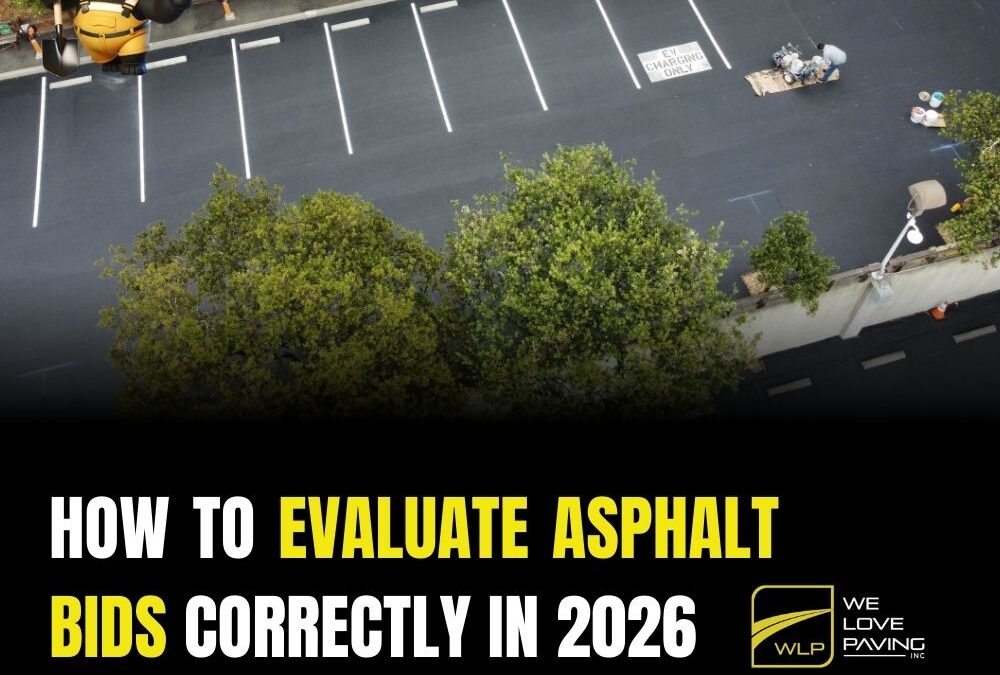Introduction
Most Property Managers make a costly mistake when reviewing asphalt bids:
They compare prices, not scopes.
In 2026 — with rising material costs, new ADA standards, and stricter inspection environments — the lowest bid is rarely the best option.
What matters is what’s included, what’s not included, and how the contractor plans to protect your asset long-term.
This guide breaks down exactly how to evaluate asphalt bids the right way so you avoid surprises, rework, and expensive failures later.
1. Don’t Compare Prices — Compare Scopes
Two bids can look similar but include wildly different work.
Before looking at cost, check for:
-
Exact square footage or tonnage
-
Base repair details
-
Saw cutting and removal
-
Compaction specs
-
Drainage considerations
-
ADA compliance items
-
Material type and thickness
-
Number of coats (sealcoat)
-
Limits of work clearly defined
If the scope isn’t detailed, the price is meaningless.
The lowest bid usually hides missing work.
2. Confirm Thickness and Material Type
This is where 90% of asphalt failures begin.
For paving:
-
2” compacted ≠ 2” loose
-
“Asphalt overlay” ≠ “mill & pave”
-
“Patch” ≠ “full-depth repair”
For sealcoat:
-
One coat is never enough in commercial settings
-
Sand load matters
-
Application method matters (spray vs squeegee)
A “cheap” bid often uses:
-
Less material
-
Lower-quality mix
-
Thinner layers
-
Minimal base repair
Which leads to early cracking, puddles, rutting, and total failure.
3. Check the Base Work — It’s the Most Important Part
A great-looking surface can hide a bad base.
Ask the contractor:
-
Did they inspect the base condition?
-
Do they propose full-depth repairs where needed?
-
Will they compact subgrade to proper density?
-
Are they replacing unstable areas or just overlaying them?
If the base is bad, the asphalt will fail — no matter who installs it.
A bid without proper base repair is guaranteed to cost more later.
4. Verify ADA Compliance is Included
California is extremely strict with ADA measurements.
Most lawsuits come from:
-
Slopes over 2%
-
Incorrect striping
-
Bad transitions
-
Missing signage
-
Wrong dimensions on stalls or access aisles
A lot of contractors ignore ADA details and leave the PM exposed.
Make sure the bid includes:
-
Slope verification
-
Correct signage
-
Access aisles
-
Truncated domes
-
Proper layout per ADA 2026 standards
If ADA isn’t included → the bid is incomplete.
5. Look for a Clear Traffic Control Plan
Traffic control can easily add thousands to the final invoice.
A professional contractor includes:
-
Phasing plan
-
Clear closure diagrams
-
Safety cones and signage
-
Pedestrian pathways
-
Work hours and duration
If this is missing, expect delays, confusion, and cost overruns.
6. Review Warranty Terms (Most PMs Skip This)
Warranties reveal how confident the contractor is in their work.
Compare:
-
Length of warranty
-
What’s covered
-
What’s excluded
-
Workmanship vs material
-
Response time for callbacks
Contractors who do low-quality work rarely offer solid warranties.
7. Look for Documentation & Communication Style
Great contractors prove their value through:
-
Pre-job photos
-
Detailed proposals
-
Daily updates
-
Final walkthrough
-
Clear communication
Poor communication almost always leads to:
-
Scope disputes
-
Delays
-
Misunderstandings
-
Surprise costs
A clean bid usually predicts a clean project.
8. Understand the True Cost of “Cheap” Bids
Cutting corners on asphalt is extremely expensive long-term.
Cheap bids often mean:
-
Insufficient thickness
-
No base repair
-
No ADA compliance
-
Low sand loads
-
Weak prep
-
Single-coat seal
-
No traffic control
-
No warranties
This leads to:
-
Water intrusion
-
Alligator cracking
-
Premature failure
-
Costly rework
-
ADA issues
-
Tenant complaints
The “cheap” job ends up being the most expensive.
Conclusion: A Good Bid Protects Your Asset — Not Just Your Budget
Evaluating asphalt bids the right way means going beyond the number at the bottom.
Look for:
-
Detailed scope
-
Proper materials and thickness
-
Base repair
-
ADA compliance
-
Traffic control
-
Warranty
-
Professional documentation
The right contractor doesn’t just give you a price —
they give you clarity, protection, and long-term savings.

